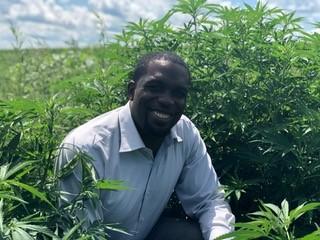Canurta: Exploring the anti-inflammatory benefits of hemp with CEO Akeem Gardner
Chronic disease is one the world’s largest health challenges. Canurta Founder and CEO Akeem Gardner believes that hemp could be the answer to preventing and managing chronic disease effectively and safely. Check out our Q&A with Akeem below:

Can you tell us a bit about how Canurta came to be?
Canurta is the perfect story of entrepreneurial hard work, collaborative efforts, trusting the science, and incredible timing. About five years ago, after graduating from law school, I founded a company named Atlas365, whose mission was to explore all the hidden secrets of the industrial hemp plant in the emerging industry of legal cannabis. In launching this company, I had decided that instead of continuing my journey towards being a lawyer, I was instead going to turn myself into an industrial hemp farmer and build a team and organization who believed that the industrial hemp plant would be an essential pillar for sustainable development in a world threatened by climate change and which needed dire solutions.
Luckily, this decision was perfectly timed, as researchers at the University of Guelph were looking for an industrial hemp farmer who they could partner with to explore novel phenolic molecules hidden in the hemp plant that had extreme therapeutic potential regarding anti-inflammatory and anti-viral activity that were previously unexplored but could be extremely valuable. And thus, a relationship was born between Atlas365 and these professors, which ultimately led to Canurta Inc — the pre-clinical biotechnology company focused on upcycling hemp biomass and waste material to develop therapeutics that can help people and animals with current and future chronic diseases and pandemic-related illnesses.
What indications did you have that this was research ready to be commercialized and it was time to launch Canurta from Atlas 365?
Timing and opportunity lead to the launch of Canurta Inc. The mere chance that we had as Canadians and a legal environment to do research and development within to understand these novel molecules and their clinical and commercial potential before the rest of the world was cause enough to go full force launching Canurta.
Canada was the first G7 Country in the world to federally legalize cannabis, after Industrial Hemp was legalized federally with Industrial Hemp Act 1998. This gave the University of Guelph researchers the ability to be the first in the world to have the ability to study the plant and develop the technology required to capture, concentrate and purify our molecules of interest from waste material.
Understanding the competitive advantage we had as a commercial entity to continue to build upon this work and increase our first-mover advantage, I knew that we needed to create an entity with a business thesis focused on these novel molecules to raise the capital required to accelerate this work and become a unique company in the global industry of biopharma development and the creation of novel, safe therapeutics.

There has been an increase in wellness uses of cannabis in recent history. How does Canurta’s work with cannflavins differ?
Canurta is the beneficiary of all the hard work done to understand the cannabis plant and why it provides therapeutic effects. One of the themes of Canurta’s work is premised on the concept and understanding of nature’s synergistic effect. Recently, it has become understood that pure or isolated cannabinoid therapeutics do not work as well as whole-plant-derived therapeutics.
The idea behind this finding is that all the molecules found in the plant, the cannabinoids, terpenes and other molecules work together to provide the patient benefit. It also suggests that there are molecules in the plant, outside of the cannabinoids and terpenes, that have a therapeutic use that contributes to the synergistic effect. As such, the researchers at the university decided to focus on studying and understanding a novel group of bioactive molecules in the hemp plant, flavonoids unique to hemp called cannflavin A and cannflavin B. Flavanoids are traditionally found in fruit and vegetables with antioxidant and anti-inflammatory effects. Cannflavin A and B were first discovered in the mid-1980s, and although minor in the hemp plant (found in under 0.014% of the plant’s biomass), they were shown to have extreme anti-inflammatory potency (that of 30x the active ingredient in Aspirin) without the adverse effects found in many non-steroidal anti-inflammatory drugs.
With this potential in mind — Canurta is focused on expanding the knowledge around these rare, natural molecules and optimizing them for human and animal wellbeing. A class of ingredients that are non-cannabinoid, non-psychoactive, non-addictive, with no known adverse effects, and high therapeutic potential would be precious for our most important stakeholders, Canadian and Global Citizens who are fraught with chronic disease and illness — many of which stem from systematic chronic inflammation.
What’s next for you and Canurta?
Canurta is highly grateful for the support from the government of Ontario that has been provided through the Ontario Centre of Innovation (OCI). It has enabled us to develop the technologies required to bring these novel molecules to market. We are currently working on scaling up the biosynthesis of cannflavin A and B, as well as other rare molecules in the hemp plant and waste material that the industry is unaware of. We hope that with this knowledge, scientists worldwide can work to make the next generation of safer, more efficient medicines that will help humans and animals suffering from chronic diseases. We have several research projects investigating our molecules at the University of Guelph and other institutions around Canada. And we are working to scale up the production of our molecules, building our farm processing facility in the Niagara region that should come online later this year.

If you could give any advice to others looking to launch a company, especially for those looking to commercialize research, what would it be?
My number 1 advice is to have fun with your work and build a team of people you enjoy working with. Everything is about the people you work with, and when you work with a group like the one I have been blessed to have — it makes everything that much easier. Science and the commercialization of research are hard: experiments don’t always work out; you have regulatory issues; production issues; need capital to commercialize; have non-believers (especially when doing something brand new); educational roadblocks; etc. But when you have a good group of talented, educated individuals that you like to work with — all the roadblocks become challenges you enjoy working through.
I would also say to follow the science — good science at that. When you base your work on sound, credible research, which we are fortunate to have in Ontario, and Canada more broadly, good things happen that are hard to refute. When people, investors, or anyone tries to doubt your work, you can always fall back on the hard work that has gone into your project and the benefit that science tells you will come from your job once you can get your product to market.
Good people and good science are confidence-building foundations that we have built Canurta around. I would suggest that others looking to launch a research-backed company should look towards a similar foundation as they work towards their goals and mission.
Learn more about Canurta: https://www.canurta.com/




